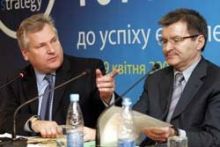In the following interview, Hryhorii NEMYRIA, Ukraine’s Deputy Prime Minister for European Integration and International Cooperation, shares his views on the strategy and tactics that the Ukrainian government should use during the Brussels negotiations on signing intensified agreements on the free trade area and cooperation between Ukraine and the European Union. He believes that the Ukrainian parliamentary opposition can play a constructive role in the negotiating process by offering alternatives and helping to bring Ukrainian industry in line with EU requirements.
President Yushchenko is demanding that an agreement with the EU be signed by the end of the year. Is this realistic? I think people should remember that the talks are being held by two sides. You cannot conclude an agreement by yourself. There is another side, the European Union. There are representatives who are conducting the negotiations, having obtained a mandate from the European Council. It is the European Commission that has this kind of mandate. The talks have just begun. I am unaware of any instances of successful negotiations, when a red-letter day was set before the end of talks.
It is also important to compare the experience of other countries. We know that it took some countries between two and five years to hold successful negotiations on a free trade area. I think it would be good if we had two years. If we conclude them earlier and successfully sign a proper agreement with the EU, we will have an occasion to congratulate ourselves. It will be much worse if we set a certain deadline and then do not meet it and try to find an excuse by pointing to somebody’s evil plots against us.
What tactic should we apply, considering that two agreements have to be signed almost simultaneously?
Right now we are negotiating an intensified and comprehensive agreement on a free trade zone. There is a question of the correlation of the political and economic/commercial parts. It is absolutely clear that for the success of these negotiations we should create a mechanism that would carry out horizontal coordination. So far there is no such mechanism. And as long as it is absent, this will adversely affect the quality of the negotiations on the free trade area.
What goals should Ukraine set itself for the Ukraine-EU summit in September?
There is no such thing as unsuccessful summits. All summits are successful by definition, and there is every reason to expect that this September summit, presided over by France, will be successful. The government and the president are now working hard on what this success will consist of.
Is the Yulia Tymoshenko Bloc also responsible for maintaining the coalition and fulfilling all these tasks in the European direction?
This is in fact a precondition for the success of the negotiations. We said that one of the reasons why the WTO negotiations dragged on so long was the frequent changes of government, which seriously affected the negotiating strategy, let alone the tactic, to say nothing of the changes in the team of negotiators. This too had a negative effect on the negotiating process. It is therefore obvious that political stability, including the stable work of the government and parliament, which is inseparable, is one of the crucial prerequisites not only for conducting the talks but also for completing them within a time frame that would be convenient for Ukraine.
How can the opposition parties be involved so that they will advance alternative proposals for the free trade area talks?
I think it’s absolutely crucial to propose alternatives instead of attaching labels. There should be more concrete proposals if there are no strategic differences. This is the logic, in my opinion. When the Party of Regions was in power, it really made an effort to get a considerable number of WTO-related laws passed in parliament. And it would be illogical to defer the ratification of the laws and protocol on the WTO, although there are some indications of such an intention. If your attitude to the WTO has changed, please say so clearly. If not, please suggest an alternative, a different approach, taking into account vulnerable sectors of the economy.
Since the Party of Regions derives strong support from the industrial east, it would be quite logical to expect this party to propose a strategy of adaptation and reconstruction of the old industrial regions with due account of Ukraine’s accession to the WTO. I would discuss this in terms of not dangers but new possibilities that accession is opening up, from the viewpoint of modernizing the industrial structure in, for example, the Donbas, where I come from. I think it would be an honorable task for the BYuT, NU-NS, and all the other parties represented in parliament to propose adaptation strategies that would not run counter to the spirit and the letter of the WTO under crowd-pleasing slogans of defending national producers.








